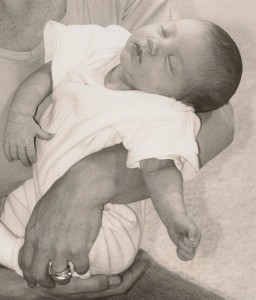
Newborn Hope, May 2001
In the late 1990s, Lauren and Henry were a young married couple looking forward to starting a family when Lauren was diagnosed with cancer. Lauren and Henry were advised by her doctors to retrieve eggs and bank embryos but the couple was still left with a dilemma. How would they find a surrogate carrier for the embryos? In the end, the couple didn’t have to look far.
Henry and his cousin Pamela were close as children but as they grew up and started their own lives they also grew apart. Married with three children, Pamela did not have a lot of time to spend with her cousin and his wife but when she heard about their plight, she knew she wanted to do something. In a recent interview with the Oncofertility Consortium, Pamela MacPhee discussed her experience carrying and giving birth to Henry and Lauren’s child. When Pamela was making that decision she wasn’t able to find information about, “the challenges of sharing a pregnancy with another couple or anything comprehensive about what to expect as a surrogate,” which led her to write a book about the story.
Delivering Hope: The Extraordinary Journey of a Surrogate Mom covers many aspects of Pamela’s experience, from dealing with painful hormone injections to forming an incredible bond with Henry and Lauren. In fact, MacPhee states, “Our relationship was the most unexpected and wonderful byproduct of the pregnancy.” Pamela gave birth to Henry and Lauren’s baby in 2001 and, as a precocious 9-year old, Hope is immensely proud of her unique birth journey. MacPhee recounted that, at an event just after the book’s release, Hope, “was there signing books with me.” MacPhee also enjoyed watching her children, then ages three, six, and eight, embrace the surrogate pregnancy. She relates that, “Kids are so good at grasping that there is more than one way to raise a family,” and have remained close to Hope since she was born.
Through the book, MacPhee recounts the personal side of the legal and bioethical issues of surrogacy that are investigated in the Oncofertility Consortium’s research. She states, “I wanted to share the message of hope of our journey,” through her book, which may help potential surrogates as they make the complex decision to provide biological children to people who have lost fertility due to cancer or its treatment.

